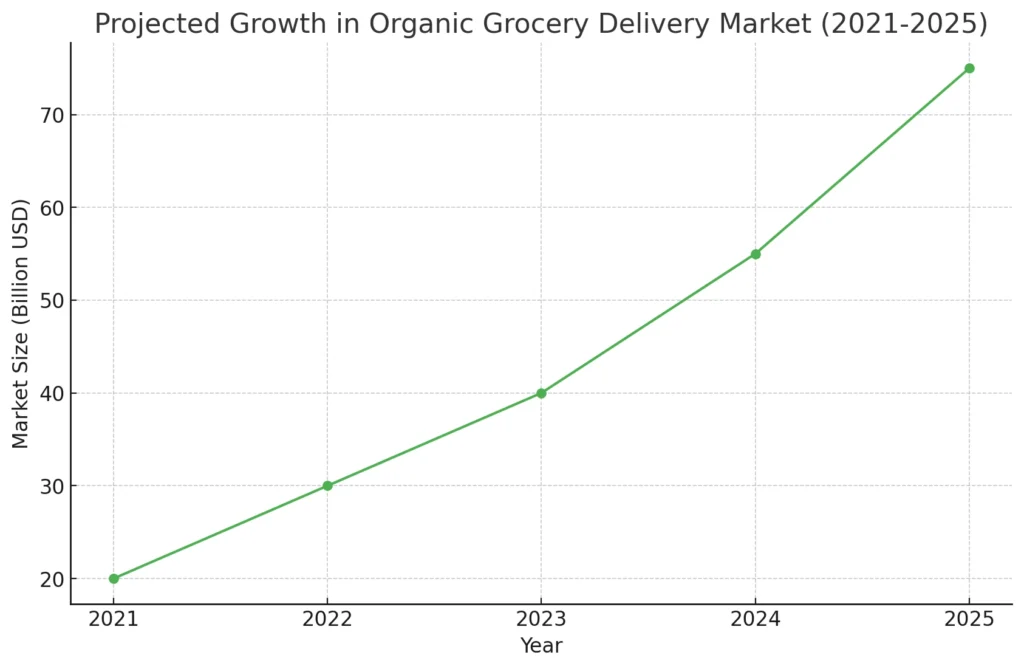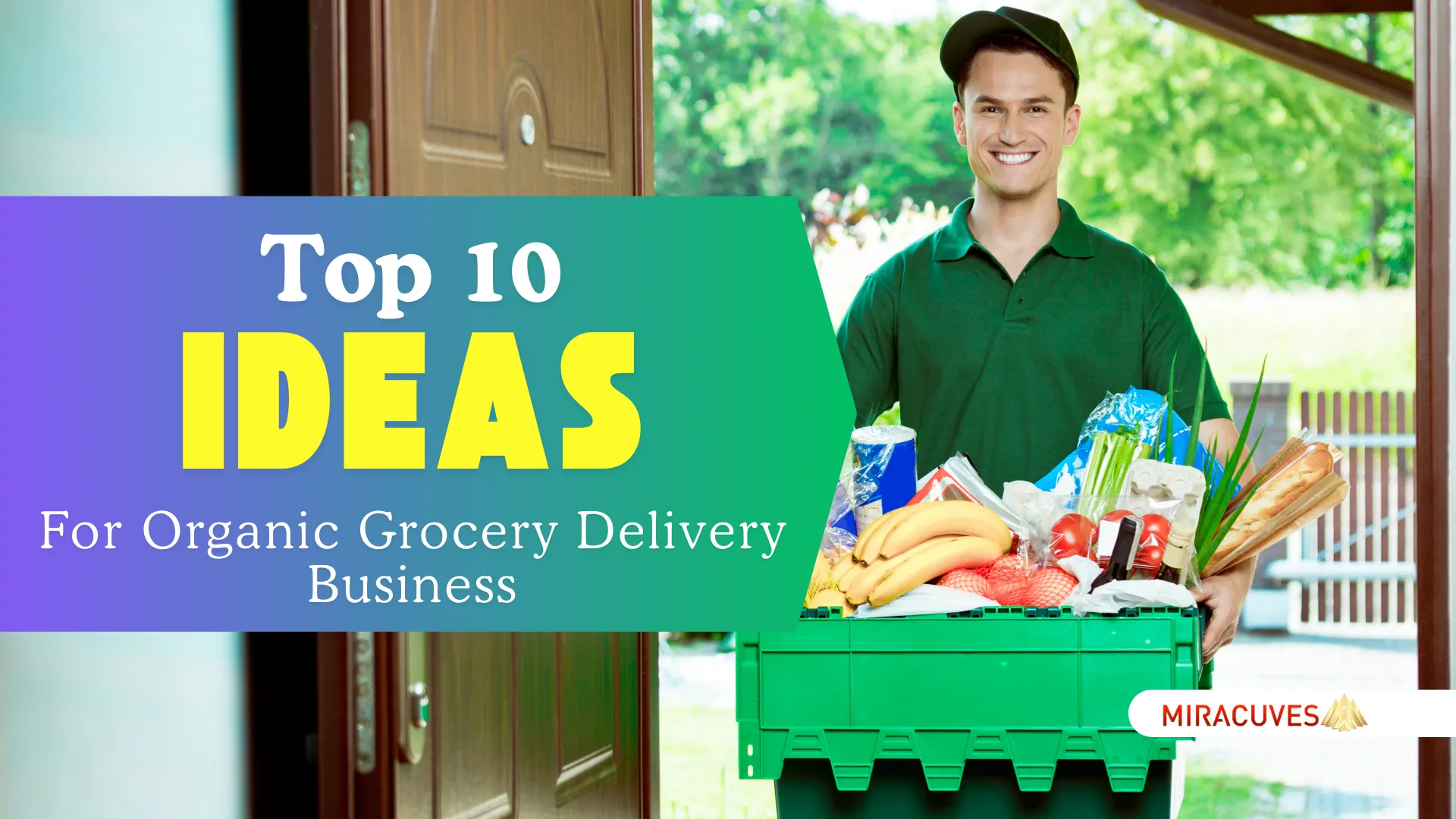The demand for organic groceries has skyrocketed as consumers become more health-conscious and environmentally aware. With people seeking fresh, pesticide-free produce and sustainable food options, the organic grocery delivery business is on a promising growth trajectory. Offering convenience, quality, and environmental responsibility, organic grocery delivery startups are filling a gap in the market by bringing farm-fresh products directly to customers’ doorsteps.
This shift towards organic produce isn’t just a trend—it’s a movement. Consumers today want more than just food; they want to know that what they’re eating is safe, sustainably sourced, and supports local farmers. This makes organic grocery delivery a powerful business opportunity that combines ethical choices with profitability. By focusing on eco-friendly practices like zero-waste packaging and sourcing from local farms, startups can tap into a loyal customer base that values both health and sustainability.
In this article, we explore ten innovative ideas for launching an organic grocery delivery business. These ideas address a range of customer needs, from convenient subscriptions and locally sourced produce to specialty items and zero-waste packaging. Whether you’re a budding entrepreneur or an experienced business owner looking to diversify, these ideas provide the foundation to start a successful organic grocery delivery business in today’s eco-conscious market.
Why Choose Organic Grocery Delivery Business?
The organic grocery delivery business has become a go-to choice for modern entrepreneurs, and it’s easy to see why. Consumers are increasingly aware of the impact of their food choices on their health and the environment, driving demand for fresh, chemical-free, and sustainably sourced groceries. Unlike traditional grocery delivery, organic delivery services offer a unique value by delivering products that are not only healthier but also support eco-friendly practices.

1. Rising Demand for Organic Products
The desire for organic foods has shifted from niche to mainstream. More people now prioritize organic options to avoid harmful pesticides and support ethical farming. This trend spans across age groups, making organic groceries a sustainable market with broad appeal. Entrepreneurs entering this space can cater to a growing audience that values clean, responsibly sourced food.
2. Convenience of Home Delivery
With busy lifestyles and an emphasis on convenience, consumers appreciate the simplicity of having fresh groceries delivered directly to their doorstep. Organic grocery delivery takes this a step further by ensuring that customers get top-quality products without the hassle of store visits. This service appeals especially to health-conscious individuals and families who want to maintain a balanced lifestyle without compromising on time or quality.
3. Opportunity for Local and Sustainable Sourcing
Organic grocery delivery businesses have the unique opportunity to partner with local farmers and producers, supporting the local economy and reducing carbon footprints. By offering locally sourced products, businesses can attract customers who want to support local agriculture while enjoying the benefits of fresh, seasonal produce.
4. Differentiation Through Sustainable Practices
Sustainability is not just a bonus in organic grocery delivery; it’s a key selling point. By incorporating zero-waste packaging, reusable containers, and minimal plastic use, businesses can stand out and appeal to environmentally conscious customers. This approach strengthens customer loyalty and builds a brand image centered on eco-responsibility.
5. Flexible Business Models for Varied Customer Needs
Organic grocery delivery offers diverse business models, from subscription boxes to on-demand delivery. This flexibility allows businesses to cater to various customer preferences, whether it’s a weekly box of seasonal produce or the convenience of ordering specific items when needed. This adaptability creates multiple revenue streams and broadens the customer base.
Current Trends and Future Opportunities in Organic Grocery Delivery
The organic grocery delivery industry is witnessing transformative changes, driven by shifting consumer preferences and technological advancements. As health consciousness continues to rise, more consumers are turning to organic options, creating a robust market for organic grocery delivery services. Here are some key trends and future opportunities shaping this dynamic sector:
1. Increased Demand for Convenience
Modern consumers are busier than ever and value the convenience of having groceries delivered to their doorstep. This trend has accelerated since the pandemic, as more people seek hassle-free shopping experiences. Businesses that offer flexible delivery options, such as same-day or scheduled deliveries, can attract a broader customer base.
2. Sustainability as a Core Value
Sustainability is no longer just a trend; it’s a core value for many consumers. Organic grocery delivery services that prioritize eco-friendly practices—such as using biodegradable packaging, reducing food waste, and sourcing products locally—can differentiate themselves in a crowded market. Emphasizing sustainability not only attracts environmentally conscious customers but also helps build brand loyalty.
3. Technology Integration
Advancements in technology are revolutionizing how grocery delivery services operate. From mobile apps that allow for easy ordering to AI-driven inventory management systems, technology enhances efficiency and customer experience. Entrepreneurs can leverage these technologies to streamline operations, track deliveries, and analyze customer preferences for better service.
4. Growth of Subscription Models
Subscription boxes for organic groceries are becoming increasingly popular, offering consumers a curated selection of products delivered regularly. This model ensures consistent revenue for businesses while providing convenience and variety for customers. By offering customizable options, businesses can cater to diverse dietary needs and preferences.
5. Health and Wellness Focus
The growing focus on health and wellness is influencing consumer purchasing decisions. Organic grocery delivery services that provide not only food but also health-related products, such as vitamins, supplements, and wellness kits, can capture this emerging market. Tailoring offerings to support health-conscious lifestyles will resonate with consumers.
6. Local Sourcing and Community Engagement
Consumers are increasingly interested in where their food comes from. Businesses that emphasize local sourcing of organic products can build strong connections with their communities. Engaging with local farmers and producers not only supports the local economy but also appeals to consumers who prioritize freshness and quality.
7. Personalized Shopping Experiences
Personalization is key to enhancing customer satisfaction. Organic grocery delivery services can implement data analytics to provide tailored recommendations based on individual purchasing habits. By offering personalized experiences, businesses can improve customer retention and loyalty.
As consumers become increasingly conscious of their food choices, the focus on sustainable practices in grocery delivery is more important than ever. Implementing eco-friendly sourcing and delivery methods not only attracts health-conscious customers but also supports local farmers and reduces environmental impact. By embracing sustainability, businesses can differentiate themselves in a competitive market and appeal to a growing audience that values ethical consumption.
Top 10 Ideas for Organic Grocery Delivery Business Startups
| Business Idea | Startup Cost Range | Target Market | Profit Potential |
|---|---|---|---|
| Subscription Box Service | Medium | Busy families and health-conscious individuals | High |
| Local Farmers’ Market Delivery | Medium | Health-focused consumers | High |
| Eco-Friendly Grocery Delivery | Medium to High | Eco-conscious shoppers | Very High |
| Customized Organic Grocery Orders | Low to Medium | Individuals with specific dietary needs | Moderate to High |
| Organic Meal Kit Delivery | Medium to High | Busy professionals and families | High |
| Online Grocery Store | High | General consumers | High |
| Specialty Organic Foods Delivery | Medium | Health enthusiasts | Moderate to High |
| Corporate Wellness Programs | Medium to High | Corporations and organizations | High |
| Organic Snack Delivery | Low to Medium | Health-focused individuals | Moderate |
| Organic Beverage Delivery | Medium to High | Health-conscious consumers | High |
1. Subscription Box Service
Create a subscription-based service that delivers a curated selection of organic products to customers’ doorsteps on a weekly or monthly basis. This model provides convenience and encourages customers to explore new organic items regularly.
- Target Market: Busy families and health-conscious individuals
- Estimated Costs: Medium (packaging, sourcing products)
2. Local Farmers’ Market Delivery
Partner with local farmers to offer delivery of fresh organic produce directly from the market to consumers. This service promotes local agriculture while providing customers with the freshest possible products.
- Target Market: Health-focused consumers and local food advocates
- Estimated Costs: Medium (transportation, vendor partnerships)
3. Eco-Friendly Grocery Delivery
Focus on sustainability by using zero-waste packaging and offering bulk purchasing options. This service appeals to environmentally conscious consumers looking to reduce waste while shopping for organic products.
- Target Market: Eco-conscious shoppers
- Estimated Costs: Medium to High (sustainable packaging materials)
4. Customized Organic Grocery Orders
Allow customers to create personalized grocery orders tailored to their specific dietary needs or preferences. This flexibility can attract a wider range of customers with different tastes and dietary restrictions.
- Target Market: Individuals with specific dietary needs (vegan, gluten-free, etc.)
- Estimated Costs: Low to Medium (inventory management system)
5. Organic Meal Kit Delivery
Provide meal kits containing organic ingredients and easy-to-follow recipes. This service simplifies cooking for customers while ensuring they enjoy healthy, home-cooked meals made from quality ingredients.
- Target Market: Busy professionals and families
- Estimated Costs: Medium to High (ingredient sourcing and recipe development)
6. Online Grocery Store for Organic Products
Establish an online platform that serves as a one-stop shop for all organic grocery needs. Customers can browse and order a wide range of organic products, from fresh produce to pantry staples.
- Target Market: General consumers seeking convenience
- Estimated Costs: High (website development and inventory)
7. Specialty Organic Foods Delivery
Focus on niche organic products, such as gluten-free, paleo, or superfoods. By catering to specific dietary trends, you can build a loyal customer base looking for specialty items.
- Target Market: Health enthusiasts and individuals with dietary restrictions
- Estimated Costs: Medium (sourcing specialized products)
8. Corporate Wellness Programs
Partner with businesses to provide organic grocery delivery as part of corporate wellness initiatives. This service can promote healthier eating habits among employees while enhancing workplace productivity.
- Target Market: Corporations and organizations
- Estimated Costs: Medium to High (contracting with companies)
9. Organic Snack Delivery Service
Offer a subscription or on-demand service specializing in organic snacks, perfect for health-conscious consumers looking for convenient, guilt-free options for snacking at home or work.
- Target Market: Health-focused individuals and families
- Estimated Costs: Low to Medium (sourcing snacks and packaging)
10. Organic Beverage Delivery
Create a service focused on delivering organic juices, smoothies, or plant-based milks. This niche appeals to customers looking for healthy beverage options that align with their organic lifestyle.
- Target Market: Health-conscious consumers and fitness enthusiasts
- Estimated Costs: Medium to High (ingredient sourcing and packaging)
Real-World Examples
The organic grocery delivery industry is rich with success stories that highlight innovative business models and effective strategies. These examples illustrate how startups can thrive by meeting consumer demands for convenience, quality, and sustainability.
| Business Model | Success Rate (%) | Common Challenges |
|---|---|---|
| Local Harvest Delivery | 85% | Managing supply chain logistics |
| Green Chef Meal Kits | 80% | Sourcing consistent quality ingredients |
| Misfits Market | 78% | Educating consumers about product quality |
| Thrive Market | 90% | Maintaining a competitive pricing model |
| Farmbox Direct | 75% | Ensuring timely deliveries |
1. Local Harvest Delivery
One successful example is Local Harvest Delivery, which connects local farmers with consumers looking for fresh, organic produce. By partnering with regional farms, they ensure that customers receive the freshest products while supporting local agriculture. Their model emphasizes community involvement, and they have built a loyal customer base that values local sourcing.
2. Green Chef Meal Kits
Green Chef is an excellent case of a meal kit service that specializes in organic ingredients. They offer customers weekly meal kits that cater to various dietary preferences, such as keto, paleo, and balanced living. By providing easy-to-follow recipes and pre-measured ingredients, Green Chef has successfully tapped into the busy lifestyle of health-conscious individuals and families. Their focus on sustainability and quality ingredients has garnered them a strong following.
3. Misfits Market
Misfits Market is another innovative player in the organic grocery delivery space. They focus on reducing food waste by sourcing “imperfect” produce that would typically go unsold due to aesthetic standards. Their subscription box model allows consumers to receive a variety of organic fruits and vegetables at a lower price point, appealing to budget-conscious shoppers who still want to make healthy choices. By promoting sustainability and affordability, Misfits Market has made a significant impact on both consumers and farmers.
4. Thrive Market
Thrive Market operates an online grocery platform offering organic and non-GMO products at wholesale prices. Their membership model not only provides significant savings but also emphasizes their commitment to making healthy food accessible to everyone. Thrive Market is dedicated to ethical sourcing and has built a community of health-conscious consumers looking for affordable options.
5. Farmbox Direct
Farmbox Direct delivers fresh organic produce straight from farms to consumers’ doors. They offer customizable boxes based on dietary preferences and family size, making it easy for customers to select exactly what they need. By focusing on convenience and quality, Farmbox Direct has carved out a niche in the competitive organic delivery market.
Mistakes to Avoid When Starting an Organic Grocery Delivery Business
Launching an organic grocery delivery business can be a rewarding venture, but there are common pitfalls that can hinder success. Being aware of these mistakes will help you navigate the challenges and set your business up for growth.
1. Underestimating Initial Costs
One of the biggest mistakes is not accurately estimating startup costs. Many entrepreneurs overlook expenses like inventory, delivery logistics, marketing, and technology platforms. It’s essential to create a detailed budget that accounts for all potential costs to avoid running out of funds during the early stages.
2. Failing to Build a Strong Supplier Network
Relying on a single supplier can lead to problems if that source fails to deliver. Failing to establish a diverse network of suppliers for organic products can result in stock shortages and unhappy customers. Building relationships with multiple suppliers ensures a steady flow of quality products.
3. Ignoring Customer Feedback
Many new businesses neglect to actively seek customer feedback. Understanding what your customers like or dislike about your service is crucial for improvement. Regularly engaging with customers through surveys or social media helps identify areas for enhancement and builds loyalty.
4. Overcomplicating the Delivery Process
While offering various delivery options can be appealing, an overly complex delivery system can lead to confusion and delays. It’s important to simplify the logistics process, ensuring that customers have a clear understanding of delivery schedules and options. Efficient operations will enhance the customer experience.
5. Neglecting Marketing and Brand Building
Assuming that great products will sell themselves is a common misconception. A strong marketing strategy is vital to reach your target audience and build brand awareness. Invest time and resources into online marketing, social media, and local partnerships to effectively promote your organic grocery delivery service.
Utilizing effective project management tools is crucial for ensuring smooth operations in your organic grocery delivery business. These tools can help you manage orders, track deliveries, and communicate with suppliers effectively. Neglecting to implement such systems may lead to confusion and inefficiencies, impacting customer satisfaction. By leveraging technology like Trello, you can streamline processes and stay organized as your business grows.
| Mistake | Impact | Solution |
|---|---|---|
| Underestimating Initial Costs | Financial strain | Create a detailed startup budget |
| Weak Supplier Network | Stock shortages | Establish relationships with multiple suppliers |
| Ignoring Customer Feedback | Missed improvement opportunities | Regularly engage with customers for feedback |
| Overcomplicating Delivery Process | Customer confusion | Simplify logistics and delivery options |
| Neglecting Marketing | Limited brand visibility | Develop a comprehensive marketing strategy |
Why Trust Miracuves Solutions for Your Next Project?
When embarking on the journey of starting an organic grocery delivery business, having a reliable partner for technology and operations is crucial. Miracuves Solutions stands out as the ideal choice for entrepreneurs looking to build a robust and scalable platform tailored to their specific needs.
1. Customized Technology Solutions
Miracuves Solutions specializes in developing platforms that cater to the unique demands of organic grocery delivery. From user-friendly interfaces for customers to efficient back-end systems for order management, they provide comprehensive solutions that streamline operations. This customization ensures that your business runs smoothly and meets customer expectations.
2. Rapid Development and Deployment
In today’s fast-paced market, speed is essential. Miracuves Solutions offers development services that are 30 times faster than traditional methods. This means you can launch your organic grocery delivery service quickly, getting ahead of the competition and starting to generate revenue sooner.
3. Affordable Pricing for Startups
Starting a new business often comes with tight budgets. Miracuves Solutions provides cost-effective development options at just 10% of global averages. This affordability allows you to invest in high-quality technology without breaking the bank, ensuring you have the tools you need to succeed.
4. Scalable Solutions for Growth
As your organic grocery delivery business expands, your technology must adapt to increased demand. Miracuves Solutions offers scalable platforms that grow with your business, allowing you to add new features and services seamlessly. This flexibility ensures you’re always prepared for the next phase of growth.
5. Ongoing Support and Innovation
Miracuves Solutions doesn’t just stop at development. They offer continuous support and updates to keep your platform at the forefront of industry trends. This ongoing partnership helps you remain competitive and responsive to customer needs, giving you peace of mind as you focus on running your business.
Conclusion
The organic grocery delivery business is not just a trend; it represents a fundamental shift in how consumers approach food shopping. As more people prioritize health, sustainability, and convenience, the demand for organic products delivered right to their doorstep continues to rise. This presents a fantastic opportunity for aspiring entrepreneurs looking to enter a thriving market.
By focusing on innovative ideas—such as subscription services, local sourcing, and eco-friendly practices—business owners can create unique offerings that resonate with health-conscious consumers. Moreover, leveraging technology to streamline operations and enhance customer experience is crucial for success in this competitive landscape.
Starting an organic grocery delivery business requires careful planning and execution, but the potential rewards are significant. With the right strategies and a commitment to quality and service, you can build a successful venture that not only meets the needs of modern consumers but also contributes positively to the environment and local communities.
As you embark on this journey, remember that every great business begins with a clear vision and a willingness to adapt. The organic grocery delivery sector is ripe for innovation, and now is the perfect time to turn your passion for healthy living into a profitable business.
FAQs
What are the startup costs for an organic grocery delivery business?
Startup costs can vary widely depending on your business model. A simple delivery service might require around $5,000 to $10,000 for initial inventory, delivery equipment, and marketing, while a more comprehensive service with a website and subscription options could range from $15,000 to $30,000.
How do I source organic products for my delivery service?
You can source organic products from local farmers, wholesale organic suppliers, or direct from distributors. Building relationships with local producers not only supports your community but also ensures the freshness of your offerings.
What technology do I need to run an organic grocery delivery business?
Essential technology includes an e-commerce platform for online orders, a reliable inventory management system, and GPS tracking for delivery routes. Investing in user-friendly software will enhance customer experience and streamline operations.
How can I market my organic grocery delivery business?
Effective marketing strategies include social media campaigns, partnerships with local health-focused businesses, and community engagement through farmers’ markets or local events. Highlighting the quality and sustainability of your products will attract eco-conscious consumers.
What challenges might I face in this industry?
Common challenges include managing supply chain logistics, ensuring consistent quality, and competing with established grocery delivery services. Staying flexible, adapting to market demands, and providing excellent customer service will help overcome these challenges.





























































